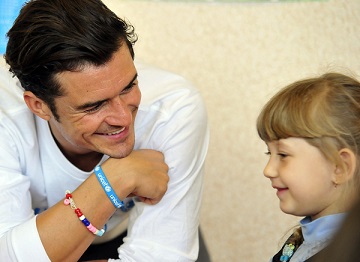UNICEF Goodwill Ambassador Orlando Bloom visits conflict-hit Ukraine to highlight the importance of education in emergencies
New report reveals nearly a quarter of the world’s school-aged children live in crisis-hit countries
Goodwill Ambassador Orlando Bloom travelled to conflict-hit eastern Ukraine to raise awareness of the global education crisis facing children in humanitarian emergencies.

UNICEF Goodwill Ambassador Orlando Bloom plays lego with pupils of School #13 in Slovyansk, as part of a visit to conflict-hit eastern Ukraine, 27 April 2016.
Bloom visited classrooms hit by shells just three kilometres from the frontline of the conflict that broke out more than two years ago. Approximately 580,000 children are in urgent need of aid and more than 230,000 children have been forced from their homes. Around one in five schools and kindergartens in the region have been damaged or destroyed and around 300,000 children are in immediate need of assistance to continue their education.
The trip came as new findings show that nearly a quarter of the world’s school-aged children – 462 million – now live in countries affected by crisis.
“I met children like 11 year old Liana who hid in the basement of their school for almost two weeks, in freezing conditions, without lighting or heat, while shelling devastated the classrooms above,” said Orlando Bloom, who first travelled to see UNICEF’s work in 2007. “Now, after surviving some of the most terrifying experiences life could possibly throw at them, all they want is to get back to the safety and routine of school and plan for their futures.”
Education Cannot Wait - proposing a fund for education in emergencies, written by the Overseas Development Institute and commissioned by a range of partners including UNICEF, reveals that nearly one in six – or 75 million – children from pre-primary to upper-secondary age (3-18) living in nations affected by crises is classed as being in desperate need of educational support. However, on average, only two per cent of global humanitarian appeals are dedicated to education.
At the very first World Humanitarian Summit in Istanbul in less than three weeks’ time, a groundbreaking new fund - Education Cannot Wait - will be launched to give access to learning to every child in need in emergencies. It aims to raise nearly $4 billion to reach 13.6 million children in need of education in emergencies within 5 years, before reaching 75 million children by 2030.
“Education changes lives in emergencies,” said Josephine Bourne, UNICEF’s Global Chief of Education. “Going to school keeps children safe from abuses like trafficking and recruitment into armed groups and is a vital investment in children’s futures and in the future of their communities. It is time education is prioritised by the international community as an essential part of basic humanitarian response, alongside water, food and shelter.”
In eastern Ukraine, and in emergencies across the world, UNICEF is working around the clock to get children back to learning – to keep them safe and secure their futures. UNICEF so far has supported the repair and rehabilitation of 57 schools in eastern Ukraine and has supplied hundreds of thousands of children with vital supplies like schoolbooks, desks and pencils, as well as psychological support and catch-up classes. UNICEF has also reached nearly 280,000 children with information on the risks posed by land mines and unexploded ordnance, which litter communities near the frontline.
“For too many children in eastern Ukraine, simply walking to school could end their life, or result in life-changing injuries,” said Giovanna Barberis, UNICEF Representative in Ukraine. “Since the beginning of the crisis, more than 55,000 unexploded landmines, shells and other ordnance have been found and removed - and we know this is just the tip of the iceberg. Our aim is to ensure that all children can safely get to class, study and play.”
During his time in eastern Ukraine, Bloom also met with schoolchildren who are receiving counselling from UNICEF-supported psychologists, to help them recover from their distressing experiences during the conflict.
“Education is providing children in eastern Ukraine with the building blocks to rebuild their lives in a safe and supportive environment,” said Bloom. “Every child in humanitarian emergencies deserves a fair chance of a bright future.”
Across the world, more than 37 million primary and lower secondary children are out of school and educational facilities are continually forced to close as a consequence of conflicts and of natural disasters – putting millions more at risk. In Syria alone more than 6000 schools are out of use – attacked, occupied by the military or taken over as an emergency shelter. In North-East Nigeria and Cameroon more than 1,800 schools have been shut due to the crisis and in conflict-hit Central African Republic a quarter of schools are not functioning.
Source: United Nations Children's Fund
- 332 reads
Human Rights
Ringing FOWPAL’s Peace Bell for the World:Nobel Peace Prize Laureates’ Visions and Actions

Protecting the World’s Cultural Diversity for a Sustainable Future

The Peace Bell Resonates at the 27th Eurasian Economic Summit

Declaration of World Day of the Power of Hope Endorsed by People in 158 Nations

Puppet Show I International Friendship Day 2020

